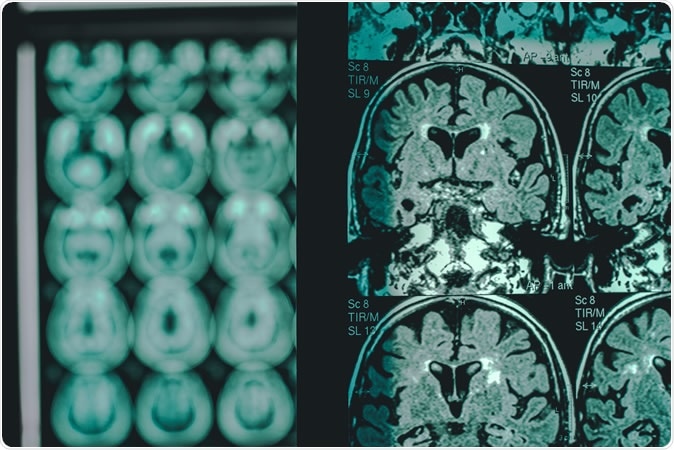Higher cumulative lifetime cognitive reserve decreased the risk of dementia, a new study found.
A team of researchers at the Tianjin Medical University in China wanted to explore whether accumulation over a lifetime of cognitive and social activities are linked to a slower rate of memory loss, hence, a lower risk of developing dementia, despite brain pathologies.
The cognitive reserve (CR) hypothesis is a compensatory mechanism to cope with age-related brain damage. It has been proposed to explain why some individuals maintain better cognitive function even with brain changes brought by aging or any disease process.

Alzheimer's disease on MRI. Image Credit: Atthapon Raksthaput / Shutterstock
The lifespan cognitive reserve score
To land to their findings and make a cumulative cognitive reserve measurement in the lifetime, the researchers enrolled a total of 2,022 participants in the Rush Memory and Aging Project, which is a current community-based cohort study.
The participants had an annual follow up between 1997 and 2018. After excluding patients who were not qualified in the study criteria, they were left with 1,602 patients without dementia, the majority are women and had a mean age of 80.
Upon follow-up, a total of 747 had died and of these, 611 underwent autopsies. The researchers then examined the reports and data between May and September 2018. The lifespan cognitive reserve score incorporated education, social activities in late life, a social network in late life, and early-life, midlife, and late-life cognitive activities. The team measured the lifespan CR score and divided them into tertiles, ranked lowest, middle, and highest.
The study findings
Of the 1,602 participants, 389 participants developed dementia, including 357 who developed Alzheimer’s disease.
Compared to those with high brain pathologies but with lowest CR score tertile, the dementia rate was about 38 to 55 percent lower in individuals both in the highest CT score tertile and high brain pathologies.
The researchers found that the highest cognitive reserve score was linked to a reduced risk of dementia, even among those with high Alzheimer’s disease pathology.
This means that cognitive reserve, which included education, cognitive activities, social networks, and social activities may reduce the risk of developing dementia.
“In this community-based prospective study of dementia-free older adults, we found that high lifespan CR indicator accumulated through education, early-life cognitive activities, midlife cognitive activities, late-life cognitive activities, and social activities in late life was associated with a reduction in risk of dementia in a dose-dependent manner,” the researchers explained.
They also stated that cognitive reserve was not linked to most brain pathologies and the link of CR with dementia remained significant even after adjustments with these brain pathologies. Lastly, they found that CR may be linked to a reduced risk of dementia even with high Alzheimer’s disease and vascular pathologies such as infarcts.
“Our findings suggest that accumulative educational and mentally stimulating activities enhancing CR throughout life might be a feasible strategy to prevent dementia, even in people with high AD or vascular pathologies. Further large population-based longitudinal studies are warranted to establish the strategies of engagement in CR-related activities for the prevention of dementia,” the study authors concluded.
What is dementia?
Dementia is a syndrome and an umbrella term for many diseases that affect memory, cognitive abilities, and behavior. These alternations in brain functions significantly interfere with a person’s ability to maintain their activities of daily living (ADLs).
Even though age is the strongest known risk for dementia, it’s not a normal part of aging. In fact, it’s the loss of cognitive functioning, which includes the ability to remember, solve problems, think, and reason. The functions affected by dementia include memory, problem-solving, visual perception, language skills, ability to focus or pay attention and self-management.
Worldwide, an estimated 50 million people are living with dementia, costing a total of $818 billion in terms of care provided by family carers. The number is expected to triple in 2050. Today, dementia is the 5th leading cause of death across the globe.
Journal reference:
Xu H, Yang R, Qi X, et al. Association of Lifespan Cognitive Reserve Indicator With Dementia Risk in the Presence of Brain Pathologies. JAMA Neurol. Published online July 14, 2019. doi:10.1001/jamaneurol.2019.2455, https://jamanetwork.com/journals/jamaneurology/fullarticle/2738336